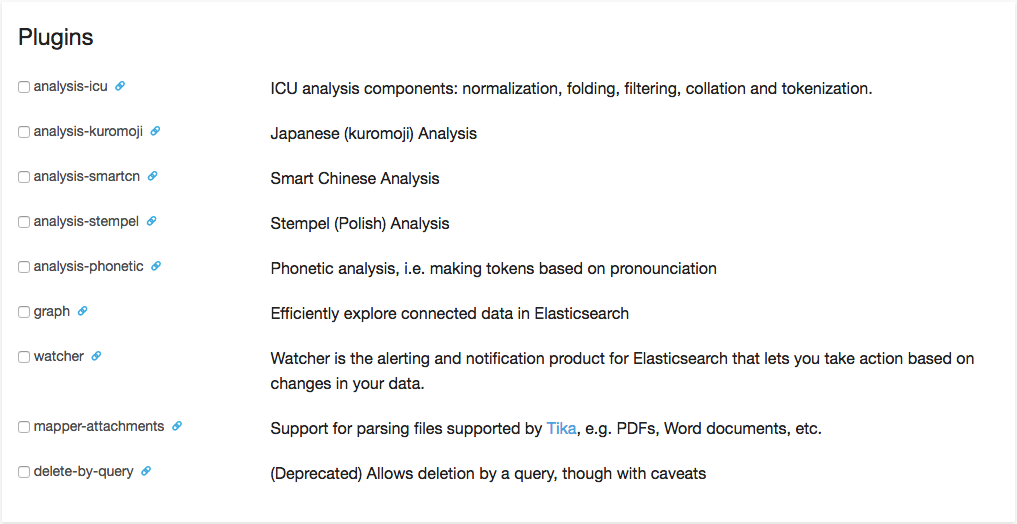Plugins extend the core functionality of Elasticsearch. There are many plugins that are suitable to extend the functionality of Elasticsearch, including:
- The discovery plugins, such as the cloud AWS plugin that allows discovering nodes on EC2 instances
- The analysis plugins, to provide analyzers targeted at languages other than English
- The scripting plugins, to provide additional scripting languages
Plugins can come from different sources: The official plugins are created or at least maintained by Elastic. Some of these official plugins are already provided with Elastic Cloud and you just have to add them to your cluster. There are also community-sourced plugins that have been contributed by other users.
To learn more about what official and community-sourced plugins are available, see Elasticsearch Plugins and Integrations.
Plugins Provided with Elastic Cloud
Elastic Cloud makes it easy to add plugins to your cluster by providing a number of plugins that work with your version of Elasticsearch. One advantage of these plugins is that you generally don’t have to worry about upgrading plugins when upgrading to a new Elasticsearch version, unless there are breaking changes. The plugins simply are upgraded along with the rest of your cluster.
You can find the list of the plugins provided with Elastic Cloud on the Configuration page in the Elastic Cloud Console.
Different versions of Elasticsearch support different plugins. For Elasticsearch 2.4.0, for example, you can add the following plugins on the Configuration page:

How Do I Add Plugins?
There are two ways to add plugins to an Elasticsearch cluster hosted on Elastic Cloud:
Adding one of the plugins provided with Elastic Cloud is as simple as selecting it from the list of plugins on the Configuration page for your cluster in the Elastic Cloud Console and clicking Update. The cluster is then updated with new nodes that have the plugin installed.
All provided plugins are listed on the Configuration page in the Elastic Cloud Console, but if you think there’s a plugin missing, feel free to post a request in our Cloud support forum.
Adding other plugins requires that you upload a custom plugin to your cluster to install it. This includes the official Elasticsearch plugins not provided with Elastic Cloud, any of the community-sourced plugins or plugins you write yourself.
Uploading custom plugins is available only to Gold and Platinum subscriptions. For more information, see Uploading Custom Plugins, Dictionaries, and Scripts.
Restrictions
There are some restrictions that apply to plugins in Elastic Cloud:
- Kibana plugins are not supported.
- Some Elasticsearch plugins have no use in Elastic Cloud. For example, you won’t ever need to change discovery, as Elastic Cloud handles how nodes discover one another.
- In Elasticsearch 5.0 and later, site plugins are no longer supported. This change does not affect the site plugins Elastic Cloud provides out of the box, such as Kopf or Head, since these site plugins are serviced by our proxies and not Elasticsearch itself.